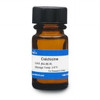Colchicine is a classic mitotic inhibitor, disrupting cell division by preventing assembly of microtubules in the mitotic spindle via inhibition of tubulin polymerization. It has pleiotropic effects; It is an anti-inflammatory agent and has been used for Gout suppression, and other inflammatory conditions such as familial Mediterranean fever. It can also induce apoptosis in a variety of cells and is used in cancer research as a chemotherapeutic agent. It is also used in cytogenetics to study chromosomes. Colchicine has been studied in COVID-19 research.
Colchicine was approved by the FDA in 2009, but its use dates back two centuries. Papyri dated 1500 BC describe the Colchicine’s source plant- Colchicum automnale (autumn crocus) for pain and inflammation, making it one of the world’s oldest anti-inflammatory agents.
There is a large body of data demonstrating Colchicine’s inhibitory effects on neutrophil activity, cytokine generation, and the inflammation/thrombosis interface. It was found to have utility against SARS-CoV2 in the ColCorona clinical trial, a phase 3, randomized, double-blind, placebo-controlled multicenter clinical trial of over 4500 participants in Canada.
Colchicine is sparingly soluble in DMSO and DMF. It is slightly soluble in water and ethanol.
This product is considered a dangerous good. Quantities above 1 g may be subject to additional shipping fees. Please contact us for questions.
| Mechanism of Action | Since one of the defining characteristics of cancer cells is a significantly increased rate of mitosis, cancer cells are significantly more vulnerable to Colchicine poisoning than are normal cells. However, the therapeutic value of Colchicine against cancer is (as is typical with chemotherapy agents) limited by its toxicity against normal cells.
Colchicine irreversibly intercalates into free α/β dimers that incorporate into and block microtubule extension. During inflammation, microtubules facilitate the movement of adhesion molecules onto cell surfaces. Colchicine has been shown to affect multiple cytokines. It decreases cytokine production by inhibiting activation of the NLRP3 inflammasome. The mechanism of its action in the inflammasome remain an area of ongoing investigation. It reduces IL-1B production, and in turn prevents the induction of IL-6 and TNF and recruitment of additional neutrophils and macrophages. |
| Microbiology Applications | Colchicine was used in a phase 3, randomized, double-blind, placebo-controlled multicenter clinical study to evaluate the efficacy and safety of Colchicine in adult patients diagnosed with COVID-19 infection with at least one high-risk criterion, who are not currently hospitalized, was done with 4506 participants in Canada. This study was called the ColCorona trial and was undertaken by Dr. Jean-Claude Tardif at the Montreal Heart Institute. It was funded by governments and philanthropies. The patients were given 0.5 mg of Colchicine twice daily for 3 days followed by a once-a-day dose for 27 days. The conclusion was that the rate of hospitalization or death was 21% lower among patients who received the compound. The study was clinically persuasive, and results are intended to be published in a peer-reviewed journal. |
| Eukaryotic Cell Culture Applications | Colchicine is routinely used to select for cells containing resistance in the MDCK (NBL-2) cell line at an effective concentration of 800 µg/mL. For additional information on your cell culture needs, please visit our Cell Culture Database. |
| Cancer Applications | Colchicine can be used to study the effects of mitosis in cancer cells. |
| Plant Biology Applications | Colchicine is an alkaloid used in plant breeding to double the chromosome number. The alkaloid doses not allow the spindle formation because it prevents microtubule assembly, and it is commonly referred to as ‘mitotic poison’. |
| References |
ClinicalTrials.gov [Internet]. Bethesda (MD): National Library of Medicine (US). 2000 Feb 29. Identifier NCT04322682, Colchicine Coronavirus SARS-CoV2 Trial (COLCORONA) (COVID-19); 2020 March 26 [cited 2021 Jan 26][~ 6 pages]. Available from: https://clinicaltrials.gov/ct2/show/NCT04322682 DeVincenzo R et al (1998) Antiproliferative activity of Colchicine analogues on MDR-positive and MDR-negative human cancer cell lines. Anticancer Drug Des. 13:19-33 Fakih M, Replogle T, Lehr, JE, Pienta KJ and Yagoda A (1995), Inhibition of prostate cancer growth by estramustine and colchicine. Prostate, 26: 310–315. doi: 10.1002/pros.2990260606 Jordan A et al (1998) Tubulin as a target for anticancer drugs: Agents which interact with the mitotic spindle. Med. Res. Rev. 18:259-296 Karapidaki I et al (2009) Genotoxic, cytostatic, antineoplastic and apoptotic effects of newly synthesized antitumour steroidal esters. Mol. Cell. 675:51-59 |



